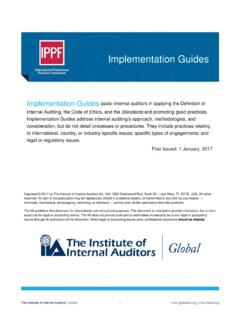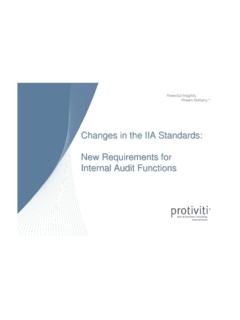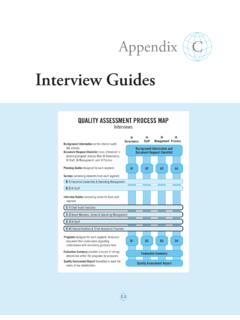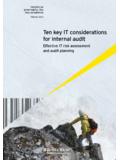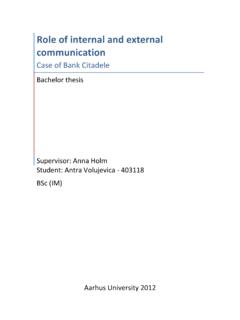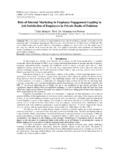Transcription of The Role of Internal Auditing During Mergers ...
1 The Role of Internal Auditing During Mergers & Acquisitions: The European Union Experience NIKOLAOS DOUNIS, BSc, MSc Student, Cass Business School City University, London - UK Internal Audit Consultant, PricewaterhouseCoopers, Athens Greece Member of the Hellenic Institute of Internal Auditors January 2007 2007 The IIA Research Foundation Disclosure Copyright 2007 by The Institute of Internal Auditors Research Foundation (IIARF), 247 Maitland Avenue, Altamonte Springs, Florida 32701-4201. All rights reserved. Printed in the United States of America. No part of this publication may be reproduced, stored in a retrieval system, or transmitted in any form by any means electronic, mechanical, photocopying, recording, or otherwise without prior written permission of the publisher. The IIARF publishes this document for informational and educational purposes.
2 This document is intended to provide information, but is not a substitute for legal or accounting advice. The IIARF does not provide such advice and makes no warranty as to any legal or accounting results through its publication of this document. When legal or accounting issues arise, professional assistance should be sought and retained. The Professional Practices Framework for Internal Auditing (PPF) comprises the full range of existing and developing practice guidance for the profession. The IIA s Professional Practices Framework provides guidance to Internal auditors globally and paves the way to world-class Internal Auditing . This guidance fits into the Framework under the heading Development and Practice Aids. The mission of The IIA Research Foundation (IIARF) is to be the global leader in sponsoring, disseminating, and promoting research and knowledge resources to enhance the development and effectiveness of the Internal Auditing profession.
3 2007 The IIA Research Foundation Page 1 TABLE OF CONTENTS EXECUTIVE I. II. Research Objectives and III. Descriptive Data IV. Reasons for the A. Management-related B. Internal Auditing C. V. Best Practices Model for Effective Internal Auditing Involvement During the Various Stages of M&A A. M&A Strategy Development B. Due Diligence C. Post-acquisition D. Post-acquisition VI. 2007 The IIA Research Foundation Page 2 ABSTRACT Mergers and acquisitions (M&As) represent a dynamic process of corporate culture and strategy. Empirical evidence indicates a high rate of failure of M&As to create value for the shareholders of the firms. On the other hand, Internal Auditing has evolved dramatically from its traditional role of control orientation to a more proactive, risk-based, and consultancy role.
4 Despite this evolution, the evidence shows that it has not effectively contributed to the M&A activity. This study will try to analyze the present level of involvement of the Internal audit function During the M&A activity and compare it with the preferred and ideal levels of involvement. This comparison will lead to the identification of possible gaps between these three different levels. This gap analysis will identify the possible reasons for this low level of involvement and possible means and prerequisites for participating more actively in specialized M&A projects. Finally, we will try to formulate and validate a best practices model of a more expanded level of involvement at the different stages of M&As, as well as a list of potential prerequisites and actions for this expansion. 2007 The IIA Research Foundation Page 3 EXECUTIVE SUMMARY Evidence assembled by several studies points to a high rate of failure of Mergers and acquisitions to create value for the shareholders of the acquiring firm, and it can occur at any of the stages of an M&A.
5 On the other hand, although the Internal Auditing profession has expanded its role beyond traditional assurance activity to a more proactive and consulting function, Mergers and acquisitions does not seem to be an area that has an effective contribution apart from the post-acquisition stage. A sample of 120 bidder companies that pursued Mergers and acquisitions in the European Union area During the sampling period (January 1, 2000 June 30, 2003) were selected and a postal questionnaire was sent to chief audit executives (CAEs) to collect preliminary data. Thirty-four (34) questionnaires were returned (28% response rate) and data was analyzed. Furthermore, we 1) selected a number of Internal audit managers and practitioners different from those participating in the first stage of the research, 2) conducted semi-structured interviews, and 3) validated our descriptive data results.
6 Descriptive and empirical data analysis has revealed a number of interesting points concerning the current and preferred situation in the Internal Auditing departments in the sample organizations. A number of gaps identified During the descriptive data analysis were discussed and validated through the interviews, providing also the motivation to collect interviewees opinions on the possible prerequisites in order to bridge the gaps between current and preferred roles . Finally, through descriptive and empirical data analysis we collected and evidenced a number of current and preferred best practices that can prove quite useful as a benchmark for an Internal Auditing department contributing at any of the stages of an M&A project. 2007 The IIA Research Foundation Page 4 I. Introduction The Internal Auditing profession faces many challenges in the new millennium.
7 Motivated by the universal mandate to minimize expenses and boost or at least maintain profits at a reasonable level, Internal Auditing departments are desperately seeking ways to add value and prove that they can still do the business for their employers. The topic of this research is concerned with the Internal Auditing role During specialized projects such as Mergers and acquisitions, with specific reference to organizations in the European Union. Internal Auditing s role has changed over the years from traditional to risk-based, proactive, and Internal consultant. Unfortunately, even though Internal Auditing has expanded its role in many business processes throughout organizations, Mergers and acquisitions activity does not seem to be an area that has effective contribution, apart from the due diligence stage. Perhaps one of the reasons is that management does not feel that Internal auditors have the necessary skills to be actively involved in all stages of a deal.
8 In 1998 The Institute of Internal Auditors (IIA) conducted a survey and asked auditors at random where they felt Internal Auditing was heading, given all of the Mergers and acquisitions activity (Davison, 20011). The answers were as follows: Most of the auditors who responded stated that they only performed due diligence testing with regard to new Mergers and acquisitions activity. Audit directors seemed to be involved at least in the preliminary discussion stages of any new business combination. Most respondents felt that more value could be added to the Mergers and acquisitions process by the Auditing department if their roles were allowed to expand. For those Auditing departments involved in the Mergers and acquisitions activity, specialized auditors were usually taking the lead rather than a team of auditors from the Internal Auditing department.
9 Most respondents agreed that culture differences and poor planning were the top two reasons for Mergers and acquisitions failure. Almost all of the respondents felt like they needed more training in Mergers and acquisitions in order to sit at the same table with the planning and implementation team. We can conclude from this that there is a potential and a need for a thorough study in the Internal Auditing role in European Union Mergers and acquisitions. The Internal audit function is potentially in a strong position to improve the quality of management throughout the M&A process and this research will try to analyze its contribution to the various stages and provide a basis for further analysis. 1 Davison, Barbara, Understanding the Mergers and Acquisitions Process (Altamonte Springs, FL: The Institute of Internal Auditors), 2001.
10 2007 The IIA Research Foundation Page 5 Managers and top management often do not understand the importance of effective Internal Auditing in all the stages of a merger. In an international study conducted (Selim et al., 20012), the Internal auditor s actual participation in the different stages of Mergers and acquisitions was as follows: Strategic planning 27% Specific acquisition planning 14% Deal structuring and negotiation 82% Post-acquisition integration 86% Post-acquisition audit 41% The need for this project arises from the increasing importance of Mergers and acquisitions in an organization s strategy. It will focus on the European Union companies trying to decipher the unique business environment in which they operate. It will also analyze the interdependence of the various functions in the M&A process and the contribution Internal Auditing can bring to the table.

